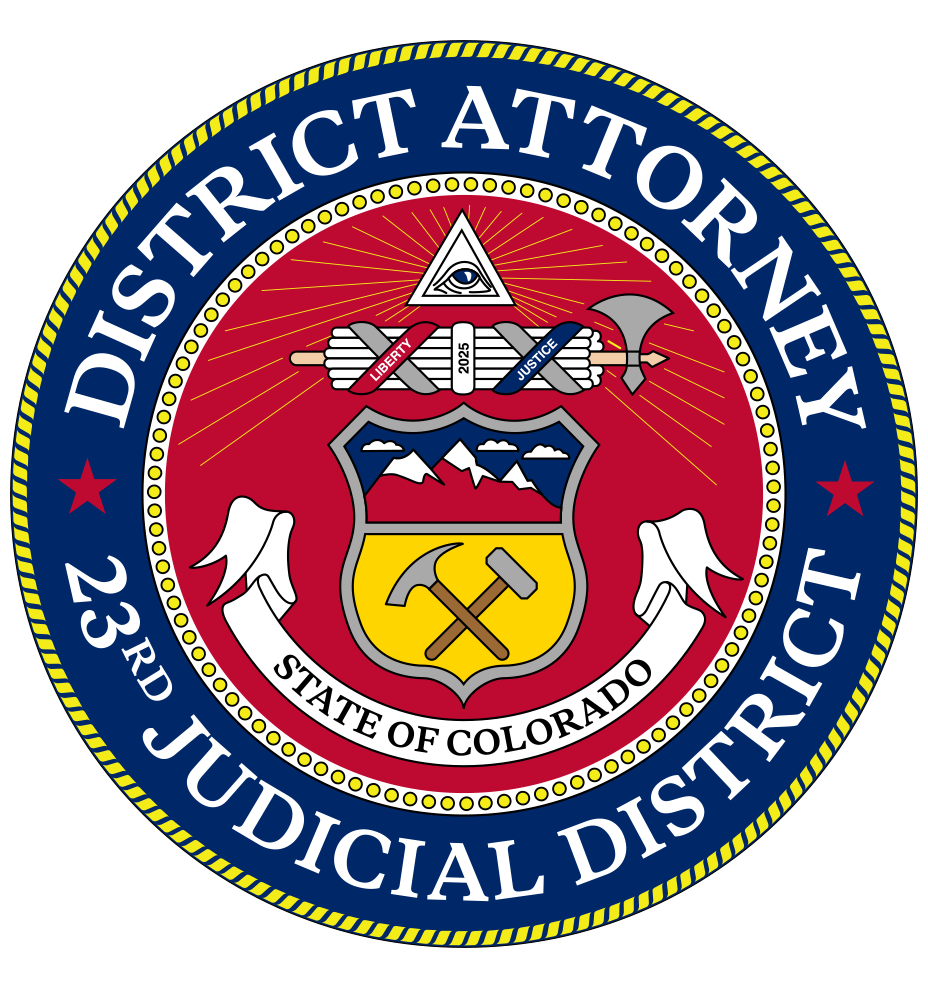VICTIM IMPACT STATEMENT
Under C.R.S.24-4.1-302.5 (g), a victim has the right to make a written and/or oral impact statement relating to the harm that the victim has sustained as a result of the crime. The victim impact statement form was designed to help crime victims provide relevant information, including sentencing recommendations. Once you receive the victim impact statement, please complete all parts of the form that apply to you (some parts may not be relevant to your case). If you are requesting restitution for losses sustained as a result of this crime, attach copies of all bills, receipts, invoices and estimates with your completed form. If you are a victim on a case that has been filed with our office but you have not received a victim impact statement in the mail, please contact the Victim Witness Unit in the county where the crime occurred.
- Douglas County District Attorney, 4000 Justice Way, Castle Rock, CO 80109 (720) 733-4531
- Elbert County District Attorney, P.O. Box 232, Kiowa, CO 80117 (303) 621-2875
- Lincoln County District Attorney, P.O. Box 307, Hugo, CO 80821 (719) 743-2223
A COPY OF THE VICTIM IMPACT STATEMENT WILL BE PROVIDED TO THE DEPUTY DISTRICT ATTORNEY, THE COURT, AND THE DEFENDANT OR DEFENSE COUNSEL.
IF YOU HAVE COMPLETED A VICTIM IMPACT STATEMENT YOU MAY RETURN YOUR COMPLETED FORM TO THE OFFICE HANDLING YOUR CASE.
VICTIM RESTITUTION
Restitution is the repayment of losses, to the victim by the offender. Restitution in a criminal case is the actual pecuniary or monetary damages that resulted from the commission of the crime. This may include: replacement cost of lost or damaged property, medical expenses, lost wages, insurance deductibles, etc. Restitution does not include damages for physical or mental pain and suffering, loss of consortium, loss of enjoyment of life, loss of future earnings, or punishment. Restitution cannot be ordered until the defendant pleads guilty or is found guilty at trial and a sentence is imposed.
The District Attorney is responsible for providing the court with the amount of restitution owed to the victim in a criminal case. This may be done through a victim impact statement, testimony at trial or through testimony by the victim at a restitution hearing.
A victim impact statement is mailed to all victims of crime where damage to a person or property is charged. This statement is provided to the Court, the defendant/defense counsel and the District Attorney. To ensure the correct amount of restitution is ordered, it is important to notify the District Attorney’s Office of your position, whether you have losses or not. By statute, restitution must be ordered by the time of sentencing. It is critical to provide all supporting documentation to the District Attorney’s Office to review as soon as available. If you would like to speak to a restitution specialist about your losses and what documentation is needed, please call the District Attorney’s Office and ask for the restitution specialist assigned to your case.
The offender has an opportunity to question the restitution requested and may ask the court for a restitution hearing. You (or if a business is the victim, a representative) may be subpoenaed to testify if the judge orders a hearing. When the final restitution figure is decided by the court, the offender will be required to make restitution payments.
Frequently Asked Questions
How is restitution ordered?
The prosecuting attorney must request the court order restitution upon conviction. The Office of the District Attorney, 23rd Judicial District has dedicated restitution specialists as a point of contact for victims of crime who are seeking restitution. It is important for any victim seeking restitution to contact the DA’s Office.
Can the restitution order be changed?
The court’s authority to modify restitution is limited. Victims requesting an increase in restitution must contact the prosecuting DA’s office to ask for assistance. Resitituion may only be decreased with consent of the prosecuting attorney and the victim(s) or if the offender has otherwise compensated the victims(s) per Section 18-1.3-603, C.R.S.
What happens after restitution is ordered?
The collection of restitution can take place over a length of time and depends on the amount owed and the offender’s financial status and ability to pay. As a practical matter, an offender who has no money or potential to make money may be less likely to make meaningful restitution payments.
Court-ordered restitution is due the day it is ordered and must be paid to the Clerk of Court. The offender is directed to meet with a Collections Investigator to establish a payment plan if they are unable to pay in full the day restitution is ordered. The payment plan will include details such as the amount of restitution and any interest owed, payment amounts, and payment due dates.
If an offender is eligible for a Colorado State income tax refund, or other monies disbursed by the state, the court will intercept the money and apply it to the balance owed.
The DA’s Office is not involved with establishing payment plans, nor can they change what may be determined. Questions about collections shall be referred to the Court Collections Department: (720) 437-6227
How long does it take for the court to discourse restitution payments?
Restitution that has been collected from offenders is disbursed by the court following a hold period, to ensure funds are available. It is important that the Clerk of Court has a victim’s correct address to ensure delivery of payments. Victims may contact their DA’s Office or notify the court of any change of address by submitting form JDF 88.
Does interest apply?
Interest accrues at the rate of 8% per year. Interest is assessed monthly and calculated on the outstanding restitution principal amount, with limited exceptions noted in Section 18-1.3-603, C.R.S. Interest continues to accrue as long as there is an outstanding restitution principal balance. For juvenile cases, interest on the judgment shall not run until the Juvenile has reached the age of 21 pursuant to §18 1.3 603(4)(b.5)(B), C.R.S.
What happens if an offender fails to make a payment?
Collections Investigators will use escalating enforcement measures to prompt payment. These measures may include phone calls, emails and letters, assessment of late fees and costs, garnishment of wages or other assets, along with other available remedies.23rd Judicial District Collections Department:
(720) 437-6227 or [email protected]
Can the victim collect restitution on their own?
Victims may choose to take on the responsibility of collecting restitution on their own. Nothing in this process requires filing a new or separate civil case in the State of Colorado.
Victims who choose to pursue collection on their own must first file notice with the sentencing court by submitting form JDF 229.
Once the notice has been filed, the following efforts by the court to collect restitution stop:
- Collections staff will not actively pursue,
- Intercepted funds will not apply, and
- Interest will no longer be calculated by the court.
The victim will be responsible for:
- Calculating interest,
- Identifying the offender’s income and assets,
- Issuing garnishments and liens through the court and notifying the court of any direct payments by submitting form JDF 242.
Victims may decide to withdraw from pursuing collections on their own filing form JDF 230 with the court. Form JDF 242 must accompanying that notice, detailing the payment dates and amounts of restitution the victim collected.
For more information and to access JDF forms, please visit www.coloradojudicial.gov. Collections Investigators and the Office of Restitution Services are available to answer questions.
For further collection remedies that the victim may pursue, please refer to Section 16-18.5-107, C.R.S.
How does the victim find out about restitution when the offender is sentenced to a correctional facility?
Collections Investigators and the Office of Restitution Services are available to answer questions, regardless of an offender’s status.
However, responsibility for collection of restitution transfers to the Department of Corrections or the Division of Youth Services while the offender is in custody of that facility. Payments continue to be sent to the Clerk of Court for disbursement to victims.
Please contact the appropriate department listed below for additional information:
Department of Corrections
Inmate Banking
PO Box 230
Canyon City, CO 81215
Phone: (719) 269-4271 or (719) 269-4052
[email protected]
Division of Youth Services
4255 South Knox Court
Denver, CO 80236
Spiro Koinis, Victim Services
Phone: (303) 866-7852 or (720) 810-3003
[email protected]

